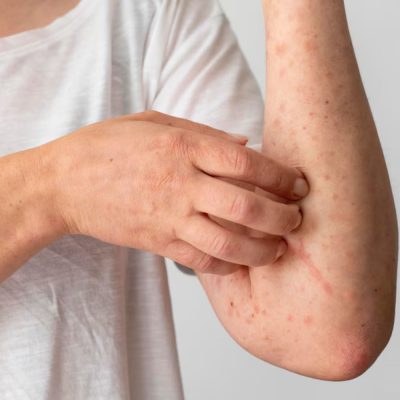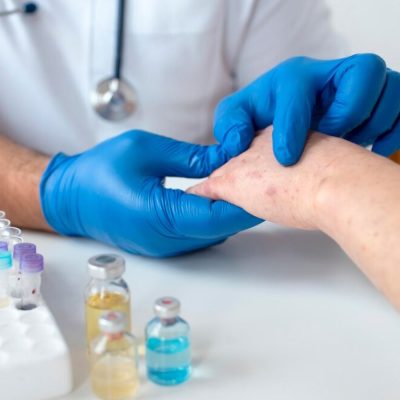Skin Infections
Skin infections are one of the most common dermatological conditions that affect people of all ages. They occur when harmful microorganisms like bacteria, fungi or viruses invade the skin. These lead to a range of symptoms and conditions. At SkinAccess Clinics, we provide expert diagnosis and treatment for various skin conditions to help restore skin health and prevent complications.

What are Skin Infections?
Skin infections can present in numerous ways, depending on the type of microorganism and the specific area affected. Some common types include bacterial, fungal and viral infections. Each type of infection requires a different approach for its effective management and treatment.
Some common types of skin infections include
Bacterial Infections
These are caused by bacteria like Streptococcus and Staphylococcus aureus. Some examples include cellulitis, impetigo and folliculitis.
Fungal Infections
These are caused by fungi like yeasts and dermatophytes. Some examples include ringworm, athlete’s foot and candidiasis.
Viral Infections
These are caused by viruses like herpes simplex and human papillomavirus (HPV). Some examples include warts, shingles and herpes simplex.
Symptoms of Skin Infections
Symptoms can vary widely depending on the type of infection and its severity. Some common symptoms include
Redness & Swelling
The affected area could get inflamed, often accompanied by tenderness and warmth.
Pain or Discomfort
Infected areas may be painful or sore to the touch.
Itching
Many infections cause itching or irritation.
Rashes or Lesions
Rashes, blisters, sores or pustules could develop on the skin.
Discharge
There may be fluid or pus discharge, particularly with bacterial infections.
Fever & Malaise
In severe infection cases, systemic symptoms like fever may occur.
Causes of Skin Infections
The causes of skin infections are diverse, depending on the type of microorganism involved.
Harmful bacteria can enter the body, causing infections if the skin is compromised. They often result from breaches in the skin barrier like cuts, insect bites or surgical wounds.
Fungi thrive in warm, moist environments, making areas like the feet, groin and armpits the most common fungal infection sites. Fungal infections are typically spread through direct contact with contaminated surfaces or infected individuals.
This can spread from contact with contaminated surfaces or from direct contact with infected individuals. Some viruses like the herpes simplex virus can spread through oral or genital contact.

Diagnosis of Skin Infections
A proper diagnosis is achieved after a comprehensive evaluation by a dermatologist. This includes a physical examination to assess the appearance and distribution of the infection. A thorough review of the patient’s medical history helps to ascertain information about any recent injuries, exposure to infected individuals or other relevant factors. Samples like swabs or skin scrapings may be obtained for pathological investigations to identify the specific microorganism. In cases of severe infections, blood tests or imaging studies may also be required.
Management and Treatment of Skin Infections
Effective treatment and management depend on the type and severity of the infection. At SkinAccess Clinics, we offer a range of personalized treatments to suit each patient’s needs.
➥ Bacterial Infections:
- Antibiotics: Topical (creams or ointments) or oral antibiotics are prescribed based on the type of bacteria, the resistance of the bacteria to certain drugs and the severity of the infection.
- Wound Care: To promote healing and prevent the infection from spreading, proper wound care and hygiene are crucial.
➥ Fungal Infections:
- Antifungal Medications: Topical or oral antifungal medications are prescribed to treat fungal infections.
- Hygiene Measures: It is important to keep the affected area clean and dry and avoid sharing personal items. This helps to prevent the spread of fungal infections.
➥ Viral Infections:
- Antiviral Medications: Medications may be prescribed for viral infections like shingles and herpes simplex to help ease symptoms and reduce the duration.
- Supportive Care: Symptomatic care like pain relief and topical creams help manage the symptoms associated with viral infections.
- Vaccines: As a preventative measure, you should keep up to date with your vaccinations. This is both in the case of infants and adults. Feel free to approach us with any queries regarding vaccination to prevent painful and long-lasting viral infections.
Conclusion
Skin infections are a diverse group of conditions that can significantly impact your quality of life. With quick and appropriate treatments, most skin infections can be effectively managed, relieving you of your symptoms and leading to improved skin health. With timely and proper vaccinations, you can even prevent having to experience the ordeal of viral infections. If you suspect you have a skin infection or are experiencing symptoms or simply want to prevent it from occurring, schedule a consultation with us today to receive the care you need.
© 2025 SkinAccess Clinics, All Rights Reserved. Made by Spoiledideas.
